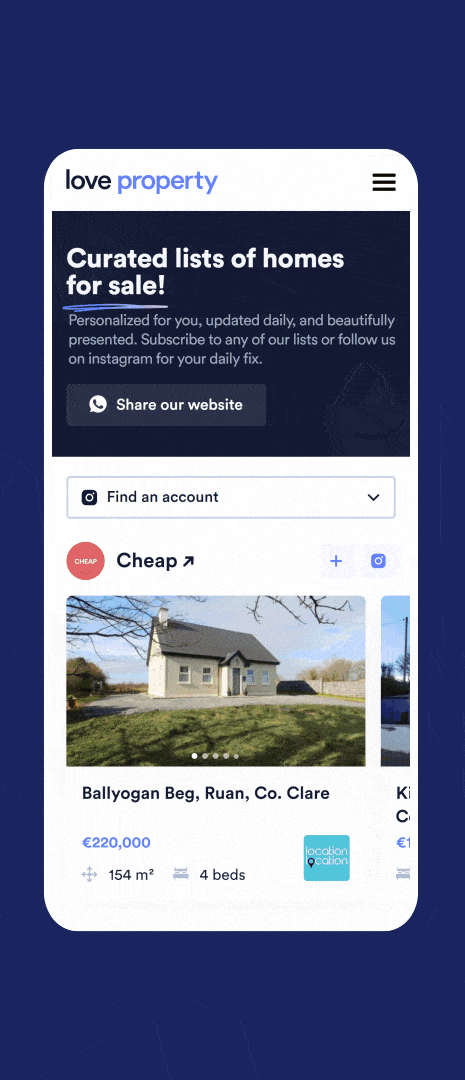
There is always a ‘next big thing’ in every industry and articles about them can tend to feel underwhelming, especially for people outside that sector. Pieces about ‘the new normal for real estate' started to feel jaded even before vaccines started being distributed around the world. That said, something about the change starting to take place on property portals does feel big and important within the context of the industry.
Maybe it’s down to the sea change in what we want from our homes and the across-the-board record traffic that has resulted from it. Maybe it’s the ever more pervasive influence of social media and its increasing overlap with e-commerce. The role that property portals play in the lives of people around the world is changing, and the products themselves are starting to evolve to reflect this. Look closely enough and you can see the trend towards personalization. It hasn’t arrived everywhere yet, but it will.
As Co-libry CEO Wendy Geeraert told us in a recent vodcast episode, “e-commerce has a big impact in user behaviour online”. Hyper personalization has been a goal of marketers at e-commerce companies for some time and that is filtering to other corners of the internet.
Users have accepted and come to expect that e-commerce stores will use cookies and other tools to track behaviour on their sites with the aim of improving individual user experience. If you clicked on a coat last time, you can be sure that next time you visit the same site you’ll be seeing that coat and a few more like it. Real estate purchases, though much more considered and expensive, are a form of shopping nonetheless, and what works on e-commerce sites will probably work on property portals.
The other factor at work here is a shift in the stage of the purchase journey in which portals enter the real estate transaction. There has perhaps been an assumption among portals and among the real estate industry in general that, unlike consumers looking to buy other goods, those shopping for a home already have a good idea of what it is that they want. Until recently this may have been true to an extent, most who ended up on a property portal would usually have a pretty decent idea of what the most important purchase of their lives should ideally look like.
As a consequence of the confined, fishbowl lives many have been living over the past 12 months, a trend towards escapism and window shopping means that there is now a significant proportion of end-users who are arriving at portals who may not have even realised that they’d like to move house yet. For this reason, the role filled by the property portal is changing from simply matching supply and demand to actually helping to spark and shape the demand as well.
To carry on with the shopping analogy: that coat that you clicked on, how did you find it? Maybe you were in urgent need of a new coat and had a good idea of what type you wanted so you clicked through to the coats section and used the filters. Or maybe that fashion retailer’s site is just one that you visit every now and then ever since you acquired the habit during lockdown, you clicked on it one day as have been doing every couple of weeks and you saw a nice looking coat being recommended for you. The latter of these two scenarios is becoming increasingly common on e-commerce sites, and crystalizing nebulous and unformed shopper desires with timely, well placed and, above all, personalized recommendations has long been essential to these sites.
There are several ways in which property portals can go about personalizing the experience on their sites and apps for each and every user and there are plenty of tech companies out there working on the problem of property portal personalization in one form or another.
According to Wendy Geeraert, whose firm has worked with several major portals, increasingly portal users “don’t always have a clue of what they want” and the most common request that data companies like Wendy’s are receiving from portals now is to work with user data to classify them and put them into buckets in order to be able to show more relevant listings.
Australian startup Proppy is another company that works with property portals on the assumption that increasingly users aren’t really sure of what they want. Promising a “curated real estate experience” for Melbourne home-hunters, the company uses AI to identify areas of the city that are best suited for each user. As one user review highlighted on the company’s website shows, personalization is very much the name of the game:
“I really liked how it gave each property a rating as to how it suited me. I have viewed many of these properties on realestate.com.au which shows it is quite good in picking out the properties I am interested in.”
As Founder and CEO Ben Huang told us, Proppy’s technology has already attracted the attention of Australian #2 portal Domain whose listings power the platform’s Market Scanner product.
Sometimes finding a place to live involves more than just selecting a location and using the logic provided by filters though. Often it’s more of an emotional, pathos-driven activity, and nothing sparks emotional responses on a property listing than the visual component - the photos.
One company working around property listing photos to improve property portal personalization is Barcelona-based restb.ai whose ‘Sherlock’ feature impressed us greatly on a recent vodcast interview. With this feature, all the user has to do is find a photo that they like, let’s say one of a really nice kitchen with all the mod-cons, and then the algorithm will go through all listings and surface all those which have similar photos from the portal’s inventory.
Aside from plug and play solutions that take a portal and tweak the selection of its inventory it displays to a given user, there is one example of a company looking to reinvent the property portal by cross-breeding it with social media. Love Property is an Irish website which in its own words is a “curated lists of homes for sale”. The site itself looks and feels somewhat like a portal with the only difference being that the listings are presented in themed Instagram-style feeds.

When we spoke to co-founder Hugo Mahony a month ago he told us that the first priority for the company was not building inventory, SEO or a marketing campaign but rather integrating more AI functionality to improve the personalization of each feed on Love Property.
While new ventures like Love Property capture the imagination, nobody is suggesting that ImmoScout or idealista should turn into Instagram overnight. For incumbent market-leading property portals, adopting a social-media approach to listings display on their portals would be costly, time-consuming and include no guarantee of success.
There may well be another avenue towards increased personalization and more social media connection with users for property portals to explore coming soon though. As WhatsApp tracking company Sudonum’s Matthew Searle recently pointed out in Linkedin post, Instagram is starting to let some business accounts include a WhatsApp number in their profile for users to get in touch. The realm of possibilities that might be opening up here is potentially interesting for classifieds businesses as Searle explains:
“Imagine classifieds doing the same thing. Posting their listings to an IG account and allowing users to enquire directly from within IG, via WhatsApp.”
Although there is the tech and there are the companies out there that can extract features from listings data without the need for these features to be specifically identified in the upload process, a recent Rightmove blog post still asks the portal’s agent customers to make sure to:
“include words and terms that you would type in if you were looking for a home like yours.”
While Rightmove may need agents to manually identify keywords in descriptions, you can bet that the market-leading property portals are at the very least paying attention to these technologies coming through.
US portal Realtor.com recently released an excellent technical blog post on how it is building an engine that sorts listings via a relevance score that is specific to the user and which is “inferred from the user’s search history”.
Very similar in terms of the language used to that used in the SEO industry to talk about Google’s algorithm, the post doesn’t go into specifics, but the implication is there that dwell time and interaction with elements such as images and maps are factored into the score which influences the algorithm:
“As the user interacts with homes on realtor.com, a score is computed in real-time that will estimate the user’s preference for a particular home.”
The obvious use for this technology is the ‘similar homes’ carousel ubiquitous on property portals worldwide. Realtor says it is also adapting it for emails and user notifications and you can be sure that portal product departments around the world are taking notes with an eye on undertaking similar projects.
There may be several different denominations of it out there, but the generally accepted ‘next big thing’ in the world of property portals on a businesses level is a move towards the real estate transaction, whether that be via ancillary services, dealing directly with developers or, as Zillow is doing, owning every step of the real estate journey.
To be able to pursue this transactional El Dorado, however, property portals need to be able to keep the one thing that their agent customers don’t currently have: user eyeballs. Personalization of what those users see, to match the expectations generated by experiences on social media and e-commerce sites, is the way for portal companies' main front and centre products to keep those consumer eyeballs.
Personalization of their experiences may lead to users staying on property portals rather than venturing elsewhere, but it’s not all bad news for agents. Logic dictates that the more personalized the listings shown to users, the more relevant these listings will be and the increasing problem of useless leads being sent and charged by portals may become less of a Monday morning chore for agents.
That the role of the property portal in society is changing will come as a surprise to few in an industry where ‘record traffic’ and even ‘record leads’ headlines are now generated far more frequently than any mentioning ‘record home sales’. Personalizing each user’s experience across their websites is just the path that property portals need to follow to be in line with broader internet trends from e-commerce and embrace this evolved role they find themselves playing in people’s new pandemic-affected, escapism-craving, phone-staring lives.